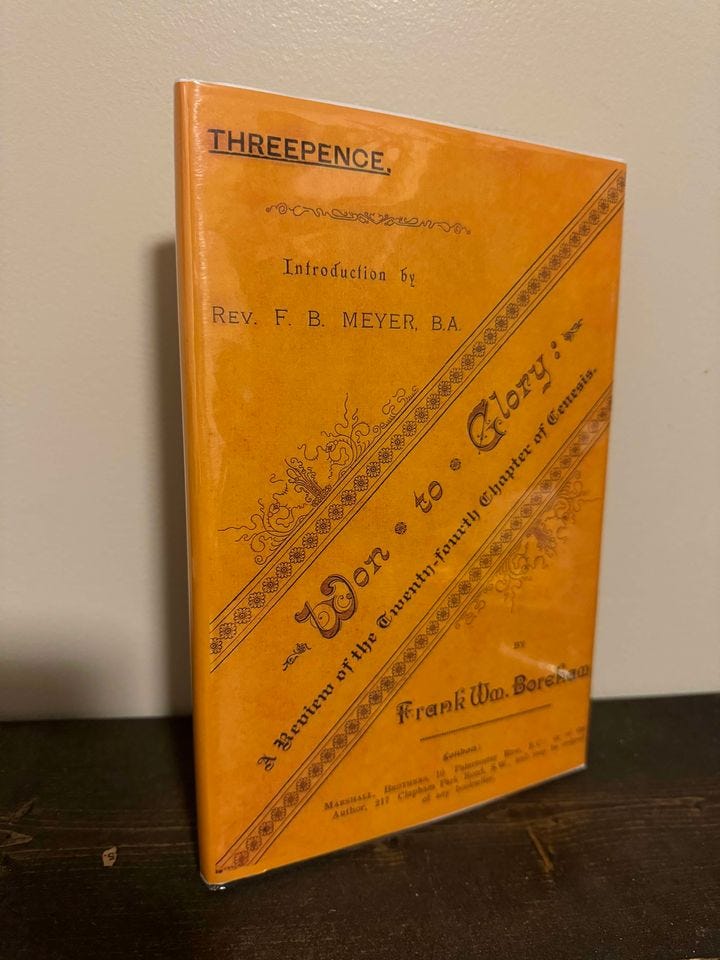F W Boreham Writes His First Book-'Won to Glory'
The text below is from T Howard Crago's biography, 'The Story of F W Boreham,' pages 41 to 43.
Meanwhile his pen was itching to write again. It was frequently attempting compositions on different themes, and he ideally wanted to write more, especially for the religious papers which now came regularly under his notice. But he was completely unknown. If he could only acquire some standing in editorial eyes, it would be much easier to approach editors with the contributions he had in mind.
Thus thinking, an idea began to form. In his Bible studies he had lately been impressed by the possibility of a symbolic interpretation of Genesis Chapter 24, in which Abraham commissions Eliezer to find a wife for his son, Isaac, and Eliezer selects Rebecca. Abraham, he considered, typified God the Father. Isaac represented Christ the son. And Eliezer stood for the Holy Spirit, while Rebekah symbolised the sinner. The meeting of Rebekah, the bride, and Isaac, the bridegroom, represented the redeemed sinner meeting with Christ in glory.
Having worked it all out in this way, he set it down to the length of 5000 words and sent off the manuscript to Marshall Brothers, the publishers, in Paternoster Row, requesting them to give it consideration. But if the contents were unusual, so also were the terms of publication which he proposed. Instead of waiting for the publishers to approve the MS, and make an offer, he suggested his own terms. These were that, instead of their paying him royalties and all copies sold, he should defray the cost of printing and receive the proceeds of all sales, less a commission for the publishers.
After a few days of anxious waiting to know the fate of his first venture in authorship, a letter came stating that Marshall Brothers would undertake publication on the proposed terms on the condition that he would send them, for inclusion in the booklet, an Introduction by the Rev F B Meyer. Nothing daunted, he wrote immediately to Mr Meyer, enclosing a copy of the MS, and asking the favour of an Introduction by his pen. Gladly acceding to the request, Mr Meyer sent his contribution, concluding with the words:
“It is because this little book seeks to unfold deep spiritual truth by the aid of this gracious story, that I have pleasure in appending these few words of introduction.”
Hidden in the mists of the future were many similar requests for Boreham’s Introductions of the maiden efforts of aspiring authors. And always bearing in mind his own indebtedness to an introducer, he would pen many a preface to the writing of others.
The new booklet bore the title, Won to Glory, and was published a few weeks later, early in November. And with this pale blue paper-covered booklet in his hand, Frank Wm. Boreham felt the first faint flush of the joys of authorship. The first review appeared in the Bible Expositor on November 26, and, in making the comment that the idea contained in the booklet was new, added:
“Mr Boreham’s treatment of the subject is, however, by no means wanting in originality; indeed, it is sometimes this originality which startles us, as there is from time to time suggested some spiritualising of the history of Rebekah which certainly has not occurred to us before.”
Many readers of Won to Glory may have gasped at its author’s remarkable exegesis. But none could doubt his sincerity, nor the evident spiritual fervour which found expression in the twenty-eight pages of this, is first book.
Amongst the first recipients of a presentation copy were, of course, Francis and Fanny Boreham. Down at Wroxton Lodge they turned the pages of their son’s slim pamphlet with visible pride. And anxious to help sales along, Francis Boreham had a pile of handbills printed – Frank knew nothing of it till he received them – by way of advertisement. But he had nothing to fear from his modest investment. Won to Glory produced enough money to pay the printer and to square accounts with Marshall Brothers on a commission basis, and even left him a few pounds in hand. But he had not sought merely monetary reward. He needed prestige, and having gained it to this extent, he was able to add to his future compositions the words, “By Frank Wm. Boreham (author of Won to Glory, etc.)”
And after Fanny Boreham had fondly perused her very own copy, she did not fail to write to her son in London to remind him of the gypsy’s prediction, “Put a pen in his hand, and he will never want for a living.” True, he couldn’t live on what he made from Won to Glory. But he was a little further on the way.




